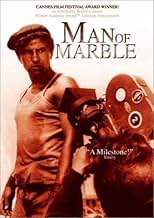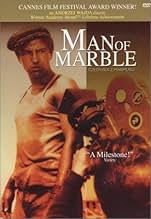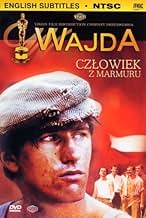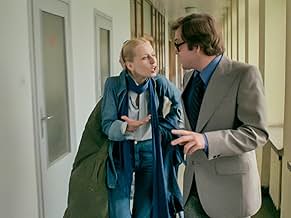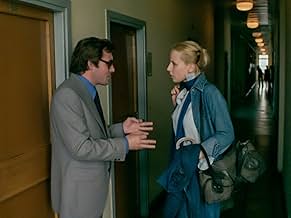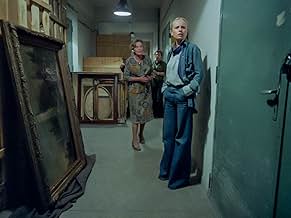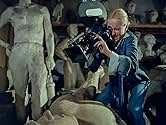IMDb RATING
7.7/10
5K
YOUR RATING
A young Polish filmmaker sets out to find out what happened to Mateusz Birkut, a bricklayer who became a propaganda hero in the 1950s but later fell out of favor and disappeared.A young Polish filmmaker sets out to find out what happened to Mateusz Birkut, a bricklayer who became a propaganda hero in the 1950s but later fell out of favor and disappeared.A young Polish filmmaker sets out to find out what happened to Mateusz Birkut, a bricklayer who became a propaganda hero in the 1950s but later fell out of favor and disappeared.
- Director
- Writer
- Stars
- Awards
- 4 wins & 1 nomination total
- Director
- Writer
- All cast & crew
- Production, box office & more at IMDbPro
Featured reviews
I first learned of Andrzej Wajda when he won an honorary Academy Award and made his acceptance speech in his native Polish. In the years since, I've watched some of his movies. I've finally seen his "Czlowiek z marmuru" ("Man of Marble" in English). It focuses on a filmmaker (Krystyna Janda) putting together a production about a man (Jerzy Radziwilowicz) who got held up as the paradigm of a heroic Stakhanovite but whose whereabouts are now unknown. Then of course arises the issue of how much she'll be allowed to focus on this man without angering the authorities.
It's safe to say that this movie presaged the rise of the Solidarity movement in its depiction of the workers. Wajda was already inclined to direct independently of the government's confines, and he became one of the most innovative directors of all, along the lines of Stanley Kubrick and Federico Fellini. In the end, this is one that you have to see. I hope to see more of Wajda's movies.
It's safe to say that this movie presaged the rise of the Solidarity movement in its depiction of the workers. Wajda was already inclined to direct independently of the government's confines, and he became one of the most innovative directors of all, along the lines of Stanley Kubrick and Federico Fellini. In the end, this is one that you have to see. I hope to see more of Wajda's movies.
Andrzej Wajda has always impressed me, and his war trilogy are among the best and most essential films in the history of cinema, but "Man of Marble" is an ambitious, interesting idea that isn't realized very well in script or in terms of the finished product.
The most interesting aspect of "Man of Marble" outside of the much-examined similarities to "Citizen Kane" is how subversive it is. I wonder how this was ever released in Poland at the time, and the scenes in the film where I felt Wajda really did succeed as a director is where he contrasts Soviet propaganda with the actual events- very powerful. Wajda fails more than he succeeds with this particular film though, it's a disjointed narrative and it takes tremendous skill to keep the audience interested in both stories. Sure, one may argue that "Man of Marble" isn't intended as entertainment, but even in the context of art-house cinema this film is only engaging in parts, with Agnieszka's attempt to make this film ending up far more interesting than the film she's making.
I can see where Wajda is going with the way he shot this film, but it just doesn't work very well, and the score for this film has to be one of the worst matches I've ever come across. It's ludicrous.
Something of a companion piece by the same writer and director, I found "Man of Iron" far more engaging and impressive.
5/10
The most interesting aspect of "Man of Marble" outside of the much-examined similarities to "Citizen Kane" is how subversive it is. I wonder how this was ever released in Poland at the time, and the scenes in the film where I felt Wajda really did succeed as a director is where he contrasts Soviet propaganda with the actual events- very powerful. Wajda fails more than he succeeds with this particular film though, it's a disjointed narrative and it takes tremendous skill to keep the audience interested in both stories. Sure, one may argue that "Man of Marble" isn't intended as entertainment, but even in the context of art-house cinema this film is only engaging in parts, with Agnieszka's attempt to make this film ending up far more interesting than the film she's making.
I can see where Wajda is going with the way he shot this film, but it just doesn't work very well, and the score for this film has to be one of the worst matches I've ever come across. It's ludicrous.
Something of a companion piece by the same writer and director, I found "Man of Iron" far more engaging and impressive.
5/10
"Czlowiek z marmuru" ("Man of Marble") goes to tells us the story of a filmmaker (Krystyna Janda) who wants to make as a film thesis a documentary about one of the heroes of Poland's communist regime, a simple man named Mateusz Birkut (Jerzy Radziwilowicz), a bricklayer who was famous for building housing for all the people, and that made him a cult figure in his country. She is trying to find Birkut, a popular figure that vanished without any explanation and she'll try to discover what happened with this mythic figure. Interviewing those who knew him and watching old footage of him, the filmmaker will make a great work about this man but her bosses who owns the funds (the Socialist government funds) for the film's realization are not very happy with her film, thinking that this might be a damaging project for them.
If the story sounds a little like "Citizen Kane" well, be ready for countless flashbacks, back and forth in the past of Birkut, and an almost inconclusive ending just like Welles masterpiece. But wait! The ending of this journey appears in "Man of Iron" (1981), also directed by the great Andrzej Wajda.
"Man of Marble" (term that refers to the propagandistic marble statues made in Birkut's image) is a powerful and brilliant story about the importance of past in the lives of everyone, it's the thing that makes us look for the future with better eyes, and in the film, we are constantly dragged down to it in order to get some answers about Birkut's future: Is he alive? Is he dead? Why he disappeared? Not just that, it is a great accomplish in showing how documentaries are made, both the protagonist work but the ones made up by the government, where Birkut and his friends were "trained" to appear important in front of camera. And, of course, a political and historical background that reveals many things about Poland and how strict the society were back in the 1950's and even in the 1970's with an absolute control on everything filmed, said and all.
Unique in many senses, "Man of Marble" present us the sad reality of Communism with masked realities where everything presented as good but in the surface it wasn't all good, and Birkut realizes that after a painful incident and after the suspicion that his friend was a spy, something that he never agreed, and that made him fight with the ones who put him on a good position among people, the government.
It is a well made film, with terrific performances by the cast, and a magnificent screenplay that knows how to evoke many times, many periods of Poland without being confusing (something that was problematic in its sequel), everything works fine. Bravo, Mr. Wajda. 10/10
If the story sounds a little like "Citizen Kane" well, be ready for countless flashbacks, back and forth in the past of Birkut, and an almost inconclusive ending just like Welles masterpiece. But wait! The ending of this journey appears in "Man of Iron" (1981), also directed by the great Andrzej Wajda.
"Man of Marble" (term that refers to the propagandistic marble statues made in Birkut's image) is a powerful and brilliant story about the importance of past in the lives of everyone, it's the thing that makes us look for the future with better eyes, and in the film, we are constantly dragged down to it in order to get some answers about Birkut's future: Is he alive? Is he dead? Why he disappeared? Not just that, it is a great accomplish in showing how documentaries are made, both the protagonist work but the ones made up by the government, where Birkut and his friends were "trained" to appear important in front of camera. And, of course, a political and historical background that reveals many things about Poland and how strict the society were back in the 1950's and even in the 1970's with an absolute control on everything filmed, said and all.
Unique in many senses, "Man of Marble" present us the sad reality of Communism with masked realities where everything presented as good but in the surface it wasn't all good, and Birkut realizes that after a painful incident and after the suspicion that his friend was a spy, something that he never agreed, and that made him fight with the ones who put him on a good position among people, the government.
It is a well made film, with terrific performances by the cast, and a magnificent screenplay that knows how to evoke many times, many periods of Poland without being confusing (something that was problematic in its sequel), everything works fine. Bravo, Mr. Wajda. 10/10
'Man of marble' is usually seen as an bold, anti-communist movie which is strikingly accurate at the deep level of practices within communist countries. Indeed, trough a story of a student who tries to make a graduation film Wajda beautifully succeeds in describing at the same time the soft violence of the '70s in Poland and the totally different hardcore 'prison' violence of the Stalinist regime in the 50's. Hence, it is gradually revealed trough the eye of the camera the contrast between the heroic, raw atmosphere of the first communist years and the light perestroika of the present cinematographic time. Nonetheless, there is a common thread throughout the movie as the all-pervading party monopoly deeply affects everybody and no one has the option of an Utopian escape.
The no exit strategy is probably for me the main theme of the movie. The rebellious young girl who tries to see beneath the propaganda images is also on psychoanalytical trip to confront her family history.
There are two scenes which can more or less summaries the story: in the first one, we can see her right at the beginning in a rough quarrel with her Television supervisor, and we can consequently grasp the theme of the incessant conflict with the authority. However, if on the one level wecan see her rejecting the father figure, on the second level we can witness desire as the film maker is practically possessing the hero statue which she finds in a basement of a museum.
Well, basically the catch of the movie is the intertwine of the story with the girl on the way of her desire and the political level which makes this trip also a trip of a historical clearing up. And, in the strange development of we find that the "fake" hero is in fact an authentic one and that we did know the secret of the narrative - the "hero"(the father, the phallus) of the propaganda is the "true" hero, as he had to face real tough moral problems and he lived "the life in truth" . The heroine can develop at last real emotional attachment with the paternal image and she eventually can end her trip by accepting an ally and a friend in the final scene.
The no exit strategy is probably for me the main theme of the movie. The rebellious young girl who tries to see beneath the propaganda images is also on psychoanalytical trip to confront her family history.
There are two scenes which can more or less summaries the story: in the first one, we can see her right at the beginning in a rough quarrel with her Television supervisor, and we can consequently grasp the theme of the incessant conflict with the authority. However, if on the one level wecan see her rejecting the father figure, on the second level we can witness desire as the film maker is practically possessing the hero statue which she finds in a basement of a museum.
Well, basically the catch of the movie is the intertwine of the story with the girl on the way of her desire and the political level which makes this trip also a trip of a historical clearing up. And, in the strange development of we find that the "fake" hero is in fact an authentic one and that we did know the secret of the narrative - the "hero"(the father, the phallus) of the propaganda is the "true" hero, as he had to face real tough moral problems and he lived "the life in truth" . The heroine can develop at last real emotional attachment with the paternal image and she eventually can end her trip by accepting an ally and a friend in the final scene.
If 165 minutes seems like a long time to watch a film about a Polish bricklayer who becomes a symbol for over-achievement under the Soviet state, well, it probably is, but the film is not as dry as it might sound, and it's worth watching. Wajda adds an extra layer to the story by showing a young woman director (Krystyna Janda) using filmmaking in the 1970's as a means of uncovering the truth about what happened to this guy, and it's interesting when we see that filmmaking two decades earlier had been a means of creating his image. Just as with the communist statues and artwork from the era which show clean-cut, strong, contented workers, it was a director who came up with the idea for the bricklaying challenge in order to extol the virtues of the ideal worker under communism. Despite all this, the bricklayer (Jerzy Radziwilowicz) has an endearing innocence about him. He really wants to do a good job and to set a record, and later fights to try to find his buddy who has been imprisoned. He seems like a symbol of the Polish people of the period, and it's telling this his fate remains unknown and ambiguous for most of the film.
In poking at the so-called Stakhanovite worker, those who outperformed others but then faced resentment and backlash, Wajda deftly shows how it was all based on lies. He also shows a worker falsely imprisoned, the corruption of the state, and the soullessness of the Soviet-era construction projects ("what architecture," one muses), which is pretty impressive stuff to get produced in 1977, but then again, Wajda pushed boundaries throughout his career. I loved seeing the old archival footage of the actual construction of Nowa Huta and the anti-American propaganda, and I also loved the strength of Janda's character. She's a complete badass, striking her defiant poses in bell bottoms and set to 1970's funk/disco music. Wajda's filmmaking itself is a bit workmanlike but she helps bring it to life, and as with several of his other films, this seems essential as a document of Poland over the second half of the 20th century. I probably would have rated it higher in 1977, and even now debated a higher rating.
In poking at the so-called Stakhanovite worker, those who outperformed others but then faced resentment and backlash, Wajda deftly shows how it was all based on lies. He also shows a worker falsely imprisoned, the corruption of the state, and the soullessness of the Soviet-era construction projects ("what architecture," one muses), which is pretty impressive stuff to get produced in 1977, but then again, Wajda pushed boundaries throughout his career. I loved seeing the old archival footage of the actual construction of Nowa Huta and the anti-American propaganda, and I also loved the strength of Janda's character. She's a complete badass, striking her defiant poses in bell bottoms and set to 1970's funk/disco music. Wajda's filmmaking itself is a bit workmanlike but she helps bring it to life, and as with several of his other films, this seems essential as a document of Poland over the second half of the 20th century. I probably would have rated it higher in 1977, and even now debated a higher rating.
Did you know
- TriviaThe award Burski is flaunting at the airport on his return was Wajda's own award, hence Burski is a mock self-portrait.
- ConnectionsEdited into Sauve la vie (qui peut) (1981)
- How long is Man of Marble?Powered by Alexa
Details
- Runtime2 hours 45 minutes
- Color
- Sound mix
- Aspect ratio
- 1.37 : 1
Contribute to this page
Suggest an edit or add missing content



